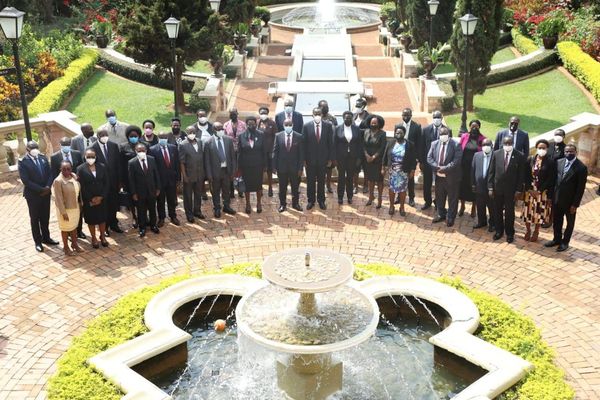On Friday, 18th February 2022, the Uganda Revenue Authority (URA) organized it's 10th annual URA Taxation Training for justices of the high court and honorable members of the tax appeal tribunal held under the theme; Developments in Tax law, policy and administration: delivering Uganda to economic independence.

Hon. Justice Ssekaana Musa (High Court Civil Division) presents a paper on Taxation at the URA Judges Conference 2022
Several Justices of the High Court and the Tax appeal tribunal gathered at Serena Hotel in Kigo to take part in a two-day training exercise aimed at equipping them with the right skill and to help them widen the information gap on taxation law, policy and administration.
According to the Uganda Revenue Authority, Uganda’s Gross Domestic Product GDP ratio currently stands at 13% which is less than the average ratio in the Sub-Saharan region which is between 16% to 20% and a lot more needs to be done to see to it that the country achieves economic independence.
As of 31st January 2022, they are approximately 350 taxation cases that are still pending holding up over 1.2 trillion shillings.

Principal Judge Flavian Zeija who was officiating the opening ceremony explained how Alternative dispute should become one of the major methods adopted to resolve the bulk backlog of cases in the different courts in the country and commended the Uganda Revenue Authority for putting in place innovations like EFRIS & DTS aimed at making the tax regime more effective.
In his part Hon. Justice Musa Ssekaana - head of High Court Civil Division, presented a paper in Taxation Training for Justices of the High Court and Honourable Members of Tax Appeals Tribunal on "The role of the Judiciary in support of the Domestic Resource Mobilization in Uganda."
In the paper Justice Ssekaana outlined the specific Objectives of the Judiciary include;
▪ To ensure that Justice is done to all irrespective of their social or economic status.
▪ To ensure that Justice is administered in a timely manner without delay.
▪ To ensure that adequate compensation is awarded to victims of wrongs.
▪ To promote reconciliation between parties.
▪ To administer substantive Justice without undue regard to technicalities.
In addition, he noted that it should be recognized that the judiciary as a key stakeholder in support of the domestic resource mobilization must ensure the Rule of Law for economic development. The role of the judiciary in promoting national development is thus of the greatest importance. For instance, the judiciary, particularly at a national level, is faced with the task of explaining how the country’s laws are contributing to and facilitating sustainable development. Therefore, economic and social development greatly depends on an effective legal and judicial system.
READ THE PAPER IN FULL HERE: The role of the Judiciary in support of the Domestic Resource Mobilization in Uganda By Ssekaana Musa
A paper presented Taxation Training for Justices of the High Court and Honourable Members of Tax Appeals Tribunal at Serena Kigo 17th- 18th February 2022.

